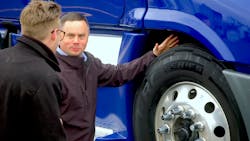Not all SmartWay tires are created equally
Price, expected mileage, and retreadability are three common factors that fleets consider when shopping for long-haul tires that can help lower their overall tire program costs. These considerations are important, but other factors such as a tire’s impact on fuel economy should not be overlooked. In fact, choosing tires that are SmartWay-Verified is one of the easiest ways to cut costs at the pump. Studies have shown that SmartWay tires can save up to 3% in fuel economy when compared to non-SmartWay tires.
Understanding SmartWay Verification
Prior to 2004, tires were not often considered as a contributor to overall fuel economy, but the advent of the Environmental Protection Agency’s (EPA) SmartWay program changed the way the industry looked at tires. The SmartWay program was intended to improve big-rig fuel economy and lower environmental pollutants, and it became clear that tires with lower rolling resistance could serve as a significant factor in achieving these goals.
To be considered SmartWay-Verified, a tire must have 15% lower rolling resistance than benchmark tires. The EPA estimates that a 15% lower rolling resistance translates to a 3% improvement in fuel economy. Once the industry saw this correlation, California became the first state to mandate that trucks have SmartWay-Verified tires in order to enter and do business in the state.
Today, SmartWay tires represent about 80% of long-haul tires on the road, and they are increasing in popularity. Tire technology has also improved over the past two decades and many manufacturers, including Cooper Tire & Rubber Co., have achieved results above SmartWay standards by adjusting tread patterns, depth, and compounds in long-haul tire designs. In fact, Cooper is already producing tires that meet the GHG (Greenhouse Gas) standards that have been set for 2027.
Evaluating SmartWay tires on the market
While SmartWay tires are more fuel efficient, what many fleets don’t realize is just how big of a gap in fuel economy there is among the many SmartWay tires currently available in the market.
A SmartWay tire that meets base requirements for the verification compared to an ultra-fuel efficient SmartWay tire can show an additional difference of 3% in fuel economy when compared to non-SmartWay tires. That can mean more than $1,500 a year in fuel savings for a long-haul truck that averages around 120,000 miles per year.
That’s why Cooper advises fleets to consult their tire manufacturer to determine rolling resistance rates for their current tires and compare them to a variety of other SmartWay tires to ensure they achieve their desired fuel economy.
Calculating rolling resistance and fuel economy
Just like truck manufacturers calculate wind-tunnel resistance and aerodynamic gains using computer software, tire manufacturers use precision test equipment to measure rolling resistance. These tests are conducted according to International Organization for Standardization (ISO) standards, and the results can be verified in both closed-track testing and in real-world applications.
By including projected fuel economy estimations in the overall cost of a tire, fleets can make a more informed decision to help ensure they are getting the best return on their tire investment.
Phil Mosier is the manager of Commercial Tire Development at Cooper Tire & Rubber Company. A 20-year tire professional, he is responsible for the design and development of commercial truck and bus tires for the North and South America regions. Mosier and his team have brought to market many successful commercial truck tires in the Cooper Commercial Series and Roadmaster brand tire lines.
About the Author

Phillip Mosier
Manager of Commercial Tire Development
Phil Mosier is the manager of Commercial Tire Development at Cooper Tire & Rubber Company. A 20-year tire professional, he is responsible for the design and development of commercial truck and bus tires for the North and South America regions. Mosier and his team have brought to market many successful commercial truck tires in the Cooper Commercial Series and Roadmaster brand tire lines.
